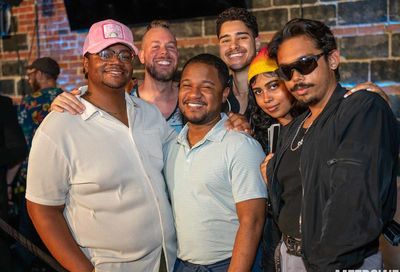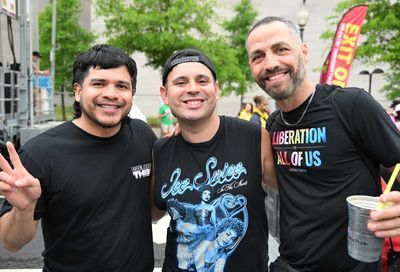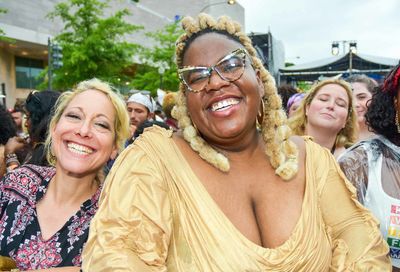Cutting through the Static
Elizabeth Birch returns to the public sphere with a new talk show and a mission: To make TV a welcoming space for gays and lesbians
F. Scott Fitzgerald was famously wrong in his declaration, ”There are no second acts in American lives.” Americans, particularly those in the public eye, have more acts than cats have lives. It’s not a matter of will there be a second act, it’s a matter of what the second act will be.
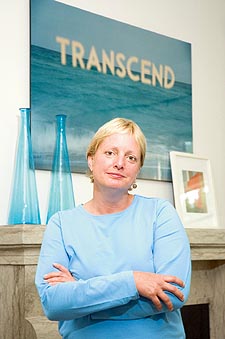 Elizabeth Birch |
Elizabeth Birch has a big act to follow. During her tenure at the helm of the Human Rights Campaign, it grew from a rather small special-interest lobby in a downtown office into a major Washington player with its own downtown building. Under her watch, HRC and its yellow-on-blue equality symbol became the brand of gay and lesbian rights. And she was one half of the quintessential lesbian power couple, along with her partner Hilary Rosen, the former head of the Recording Industry Association of America (RIAA).
The two now live with their 6-year-old twin son and daughter in upper Northwest, where Birch is focusing on her new career in corporate management consulting. But that’s just one of a number of acts that have followed her 10-year stint with HRC. She’s returning to the public eye with a new television show, Birch & Co., on the fledgling here! TV gay and lesbian cable network.
With her own extensive experience on the modern-day cable battleground of televised talk shows — she’s held her own (and then some) with many of the biggest names opposing gay and lesbian civil rights — it may seem a natural move. But Birch is aiming for something different, a return to a longer, more in-depth approach to interviewing that focuses less on argumentation and more on illumination. Her interviews with Rosie O’Donnell and anti-gay legend Pat Buchanan are already hitting the airwaves.
Will Birch & Co. pave the way for a new approach to gay issues on TV? Not even Birch knows for sure if gay and lesbian audiences will take to her format — but she’s certain to enjoy herself every step of the way.
METRO WEEKLY: What brought you to do television?
ELIZABETH BIRCH: I had a premise in mind that the GLBT community was starved, in terms of TV, for some depth and real dialogue. It comes from having spent 10 years doing TV where you go on for three minutes, mud slings back and forth, verbal assaults are exchanged, and then that’s it. The superficial treatment of our issues in terms of TV is so frustrating.
It didn’t occur to me to do TV at all. Rick Scott [president of Autonomy, which produces Birch & Co.] came to me and said ”I want to do this show.” I said, ”You should get someone else to do that.” Because it was sort of like Meet the Press with an overlay of Politically Incorrect with an overly of The Price is Right. It was an idea with multiple concepts to keep it moving. That may be legitimate [as an approach], but I said ”The only thing I want to do is just talk to people. That’s it.” And it has failed again and again in mainstream TV where you just have people talking. But I have this notion that this show may [offer] a kind of dissection of these public figures, some of whom have an influence in shaping our lives. And some interviews should just be fun and gossipy. That what the Rosie interview was — it was just like girl talk.
MW: Is there anyone you modeled your interviewing style on?
BIRCH: The persons I admire most are David Frost — I grew up with David Frost — and I loved Dick Cavett. And then Terry Gross on Fresh Air. She is the best interviewer on the planet. She is phenomenal. Watching the first episodes of my show, I have a lot to learn about asking questions.
MW: What makes you think someone is a good interviewer?
BIRCH: The way that Terry Gross does it — she draws fantastic information out of her guests. She makes them feel comfortable so that they’re sharing in a really open way. That was the challenge with Pat Buchanan. I wanted him to feel comfortable enough that he would open like a filet. Watching the tape, I was too soft on him. But he also shared information we had never heard before, about all the gay people in the Nixon White House, all the gay people in the Reagan White House, their reaction to AIDS. That stunned me. That was my first interview, so you can see me trying to find my way but not wanting to alienate him. You want to make sure you can get other guests on. You know in your business the importance of follow-up questions. I think I lost some opportunities, but nevertheless I think it was a treasure trove of information.
MW: What do you think you bring to the table in terms of interviewing skills?
BIRCH: A lifetime of experience. I’m somebody who has been gay my whole life, but I’ve also worked in different realms. I’ve lived in the realm of law. I’ve lived in the realm of the Fortune 100. I’ve lived in the non-profit world. I left home young, I had no money, I survived and made my way. I’ve struggled and lived and met thousands of people. I’m going to be 49 this year and I’ve lived a long time.
I’m endlessly curious about people. If we were on an airplane, you would start talking to me and tell me everything about your childhood — people do it all the time. I am really fascinated by people. One of the things I find frustrating about Washington is that people really don’t spill their guts very much. I love people’s backgrounds, the influence of their parents, where they grew up, what they hated, what was joyful.
MW: I’ve interviewed you twice before, and I’ve noticed that you are generally much more open about talking about yourself and about issues than most other people in similar positions. Why do you think people in Washington are so guarded where you often aren’t?
BIRCH: Because I think that the worst that can happen is that you tell the truth, and as long as it’s the truth it’s okay. You actually did one of my favorite interviews [in October 2001]. I sounded smart — I said, ”Look at everything I know, it’s kind of interesting.” But you actually helped me articulate at that time what I thought about all the public policy issues at that moment in time, and about the way the community was addressing our grand plan.
In general, the GLBT movement is getting better and better at trust. They trust each other, being open, being willing to engage in a critique of what’s working from a legal standpoint, what’s working from a legislative standpoint, how can we better coordinate those efforts. And I guess that once you have been so mutilated [by attacks and press] like I was on a few occasions in my tenure, there’s almost nothing left that can hurt you. There were just a couple of times where it literally shredded my soul. It was so painful that if you can get up and actually walk upright again, what’s an interview going to do to hurt you?
MW: Television has really become a primary deliverer of information in the U.S. Are gay and lesbian people being served well in terms of being able to get information out?
BIRCH: No. Truthfully, it’s lacking for everybody. It is such a disservice. It is one of the most dangerous things, not being able to get the kind of information we need. It’s a pretty sorry state of affairs when you can get more truthful information from a blog than you can from network news. I don’t mean just more truthful but more depth. While MTV has been fun and great, it’s not necessarily a model [for TV news programs] for a time when people live in chaos. We already have an avalanche of information and stimuli coming out on a daily basis and to have so much that is so important reduced to these quick sound bites is a real disservice to everyone in the country.
But take gay people and multiply that by 10. They are not getting the nuanced information about [important issues]. For example, there’s kind of a counter movement that’s emerging in the evangelical churches, where parents and others are saying ”We reject these hard and fast rules about gay people.” Or take some of the young conservative leaders — you’ll find them to be absolutely lockstep on every issue but gay issues. I think we have to interview the Tucker Carlsons, the Laura Ingrahams, the Ann Coulters, to separate from the panoply of conservative issues this one issue. And you can’t get at that on Crossfire or on any of these shows. There isn’t enough time.
MW: Were you glad to see Crossfire finally biting the dust?
BIRCH: No, because I love Paul Begala. It was kind of a Washington tradition and it was fun to do the show when I did it.
MW: Your pace is a little slower on your show. How do you expect that will go over in a faster-paced TV environment?
BIRCH: We’ll find out. Either people will watch or they won’t. I have a feeling that for awhile and depending on the guest, people will want this information.
I’m not a journalist. I don’t know anything about journalism standards except for what the lay person might know. This show is not journalism, it’s a conversation. I have a point of view. And the format will change. Sometimes there will be three guests. We’ll keep experimenting with that. And hopefully I’ll get better at being quiet. I’m much too enthusiastic. I keep going ”Right, yeah, oh yeah, right, that’s good.”
MW: Not too long ago, Sen. Ted Stevens (R-Alaska) introduced a bill that would charge the Federal Communications Commission (FCC) with regulating cable television under the same broadcast guidelines as free broadcast television. Given that cable is a communications avenue that’s allowed a little more freedom in terms of gay and lesbian content, do you have any fear of a backlash or the FCC gaining regulatory power that would tamp down the growth of gay and lesbian content?
BIRCH: I think that the content of here! and LOGO is tamer than Showtime or HBO. But I think in general any time a government body wants to move in and start dictating what will happen on any kind of [communications], it’s bad for democracy. What’s reflected in these [gay and lesbian] networks is a real desire to deliver product that is addressing gay people where they are now. They don’t have any pornography. Queer As Folk [on Showtime] has already pioneered a lot of the very raw exposure to sex. I don’t think Logo and here! will touch [that] for years.
MW: In a gay and lesbian publication, if you print the same risqué ad as you would see in a straight publication, people view it one way in a straight publication and view it very much more sexualized way in a gay publication. Do you feel that there’s a double standard at work that will also apply to TV?
BIRCH: I think that’s true. When you do focus groups, [straight] people say ”We just don’t want it flaunted. We don’t want it in our face.” What actually turns out to be true is that the threshold is very low. If someone at work has a picture on their desk of their partner, the straight person has a visceral reaction. They call that ”in your face.” Their threshold is so low that the mere existence of these networks will be ”in your face” to them.
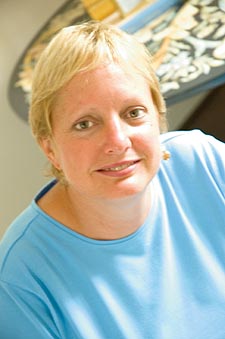 |
MW: Who would be your dream hard-to-get interviews?
BIRCH: I would love to have Louis Farrakhan with [GLBT activists] Donna Payne and Keith Boykin just before the Million More March in October.
MW: What would be your first question for Farrakhan?
BIRCH: Answer these two people, who are leaders in the gay African American movement: Why they are not worthy?
MW: Were you surprised by the recent controversy over homophobic remarks by Rev. Willie Wilson? Did you know him from your work at HRC?
BIRCH: I was shocked. Yes, I knew him. I think it’s safe to say I was the only white person at a major reconciliation between Rev. Wilson and the African-American gay community a few years ago and in the middle of that reconciliation, which included a lot of black leaders in the clergy and from different denominations. That night, the gathering was sort of stormed by Farrakhan followers, saying ”This is a white man’s disease…. We don’t need this kind of toxic waste in the bloodstream of our sons and daughters.” Really hostile, really angry. Rev. Wilson was confronting these really strong, animated, angry men. He took them on. And so for him to be so irresponsible and so cavalier about dismissing a whole part of his congregation is shocking.
MW: Have you seen that a lot in your career where someone who is supportive suddenly makes an about-face?
BIRCH: Never. I think the general experience that once there is enlightenment it only deepens.
MW: Do you think there will be GLBT inclusion in the Million More March or do you think that’s going to be a stand-off?
BIRCH: I think it will be a stand-off because it’s a cause célèbre right now and there’s a small but growing number of black preachers that are getting a lot of attention. It’s also one of those ways that Farrakhan can draw a line in the sand that he loves. A guy who’s so willing to be so openly anti-Semitic has no problem being rabidly homophobic.
MW: Do you think there’s space for your show’s format in the middle of a cable news culture that keeps political debate short and confrontational?
BIRCH: It’s a chicken and egg problem. Do the ratings go up because of that [culture] or have we developed a couple of generations of people who are used to very short, quick movement on TV? I don’t know the answer, but I think we are being lulled as a nation into the worse sense of complacency. That’s what’s scary. It used to be that you would see Rowan and Martin’s Laugh-In and then you would see the news. Now the news has become Laugh-In. When John Stewart ends up being the most credible source of information and it’s on Comedy Central, you’ve got a problem.
MW: You mentioned earlier a list of people such as Tucker Carlson, Laura Ingraham, Ann Coulter. I’m thinking of Coulter in particular — is there anybody that you would consider beyond the pale as a potential guest, in terms of the way they conduct themselves or the types of things they promote?
BIRCH: Someone said, ”Why don’t you bring on Fred Phelps?” The truth is he should be a mental patient. He should be institutionalized. He’s sick. He’s lost and sick and I think what we fail to realize is that there are a great number of conservatives that are just as offended by Fred Phelps. We have to get more and more sophisticated about how to talk to those people in our country who may identify as conservatives but know that it’s probably inherent that a certain number of people in their community will be born gay. We need to walk down the country lanes of America and get better at giving people a break and the benefit of the doubt that they are smart enough to realize that there will always be gay people.
MW: You’ve been away from HRC for about a year and a half now. Aside from the TV show, what have you been doing with yourself during that time?
BIRCH: The TV show is actually a tiny part of my life. What I did for one year was hard labor. I renovated houses. I wanted to get away from the law, from business, from nonprofit work, from the complexity of emotions that play out when you’re heading up an organization in a very controversial time. [Renovation] was almost like this whole detox process and I got very drawn to it. I didn’t know I was going to end up doing it for a year, but I ended up hammering nails and learning how to do construction. I loved it. All I could think about every day was that I wanted a red truck with tools in the back. It was such a totally stereotypical big dyke thing, but it’s all I wanted to do. It was so tangible and my entire life had not been about tangible things. It was immensely satisfying.
MW: So is your next show going to be on HGTV?
BIRCH: I have no real taste. What I really know how to do is clean up a place and put in excellent systems. I do like high-level hardware. [Laughs.]
MW: Looking at the long-term efforts of the GLBT community, it seems that cultural change will be coming. But are we making progress as a community in the short term? Is there something that the community needs to be doing to better position itself for longer-term change?
BIRCH: I think that a lot of the work is getting done and it’s getting done in a really smart way. The community doesn’t always have access to go way under the hood [of GLBT organizations] to know that. We should never underestimate that on a daily basis we’re making enormous progress emotionally and culturally in the country. We’re probably on a very long path, longer than I would have imagined, in terms of really securing the very practical rights that we need to best care for our families, our partners, our children.
MW: What are your thoughts about John Roberts’s nomination to the Supreme Court, and the news that he worked on the pro-gay side of the Romer v. Evans case that struck down Colorado’s Amendment 2?
BIRCH: We shouldn’t take too much from his work on Romer. The truth is it happens all the time — when you’re in a big firm you do things as a matter of courtesy for pro bono work that’s going on within the firm. It’s just a matter of collegial behavior that one of your number one Supreme Court partners is going to help out on anything [heading to the Supreme Court]. I don’t know how John Roberts will come out over the course of his life, but that Supreme Court has a funny effect on people. With a lifetime appointment and the gravity of their decisions, they actually realize they will have such an impact on human beings. So many that have been on the Court were absolutely appointed to be ultraconservative, and some of them have been big disappointments to the right, including Earl Warren. But I’ve also heard that Roberts is a true believer, that he really believes passionately in very narrow construction of statutes, in state’s rights, and those things are dangerous to the welfare of people in general.
MW: Are you working in any official role with HRC at this point?
BIRCH: No, I’m just a fan. And a major donor. I now feel the pain! [Laughs.] Actually, we’ve always been major donors, but now I’m like, ”Whoa, this is important.” One thing I’ll say is that I really wanted to give Cheryl her space — I really didn’t go around much at all during her tenure. Joe [Solmonese, the current head of HRC] has been wonderful. He reached out to me immediately. We did one event together in Utah. We had a blast. I adore him — he’s so smart and he’s perfect. He has the right temperament and right understanding that these jobs are not about the person, they are really about the dream of the employees. It’s a matter of channeling that energy, making sure the orchestra is working.
I had no concerns about the strength of HRC [when I left] because we really did build a brick house. I knew the bench was really deep and it turned out to be true. It’s bigger than ever and that’s a testament to the staff. They’re amazing, and they keep growing and changing. It’s a really strong institution and so far beyond any one individual. It will go on for years.
MW: The rumor was that after you left, Hilary wanted the executive director position.
BIRCH: [Laughs.] Are you kidding? Nothing could be further from the truth. I mean, Hilary loves HRC and has a long history with it, but never in one million years would Hilary be head of HRC. She’ll tell you herself. She has no patience. She was always mystified at how I could be polite to everybody, no matter what they said to me. Hilary doesn’t suffer fools easily and she will tell you.
MW: Do you and Hilary bring different approaches and personalities to your relationship?
BIRCH: I think that we are very unusual as a couple because usually there will be one who is a little more passive and a little more about nesting and the other one ventures out into the world. But Hilary and I are both very active and have had big challenges in life and like big, swirling issues. I think of us as sort of Sumo wrestlers for love. [Laughs.] We meet each other with a lot of energy. That doesn’t work for some people, but it works for us.
Birch & Co. airs on here! TV. Visit www.heretv.com for schedule and local availability.
Support Metro Weekly’s Journalism
These are challenging times for news organizations. And yet it’s crucial we stay active and provide vital resources and information to both our local readers and the world. So won’t you please take a moment and consider supporting Metro Weekly with a membership? For as little as $5 a month, you can help ensure Metro Weekly magazine and MetroWeekly.com remain free, viable resources as we provide the best, most diverse, culturally-resonant LGBTQ coverage in both the D.C. region and around the world. Memberships come with exclusive perks and discounts, your own personal digital delivery of each week’s magazine (and an archive), access to our Member's Lounge when it launches this fall, and exclusive members-only items like Metro Weekly Membership Mugs and Tote Bags! Check out all our membership levels here and please join us today!























